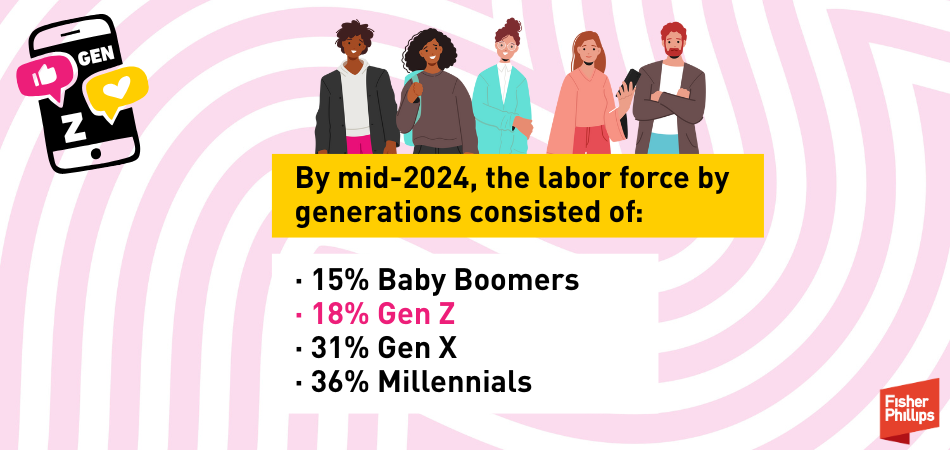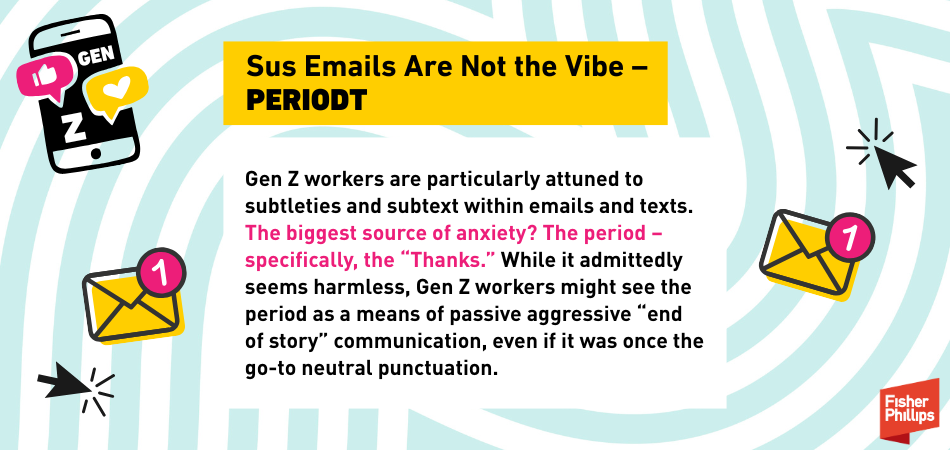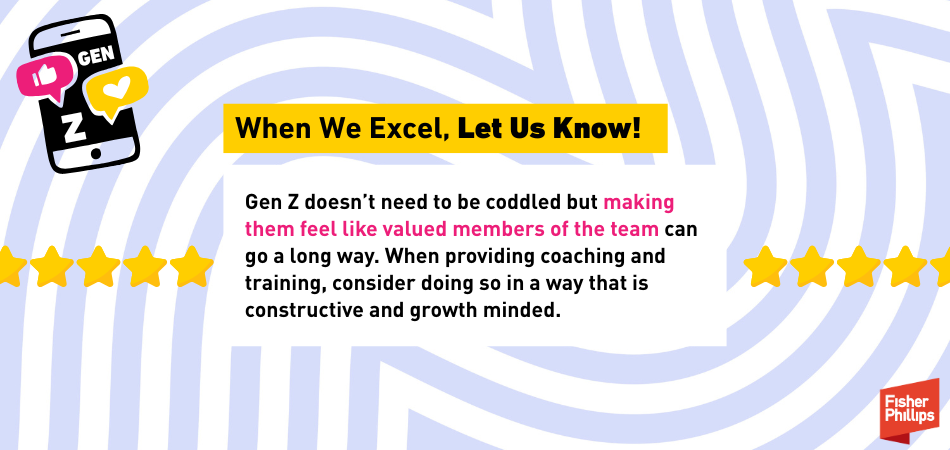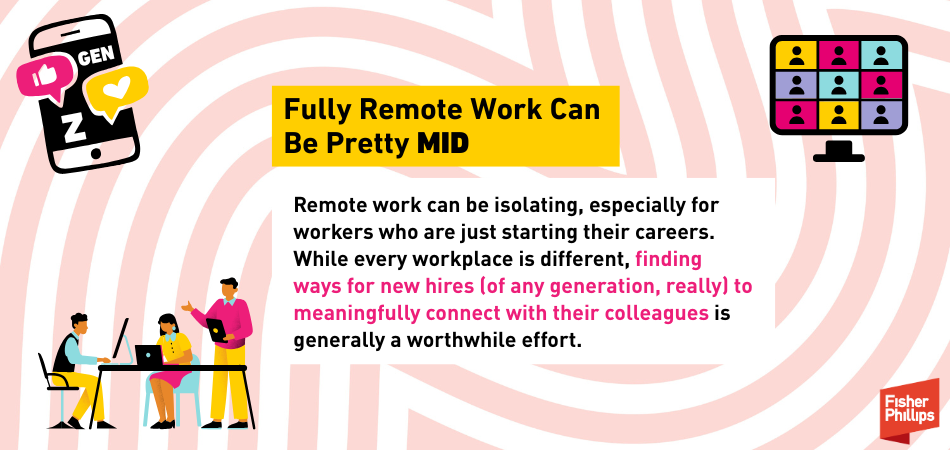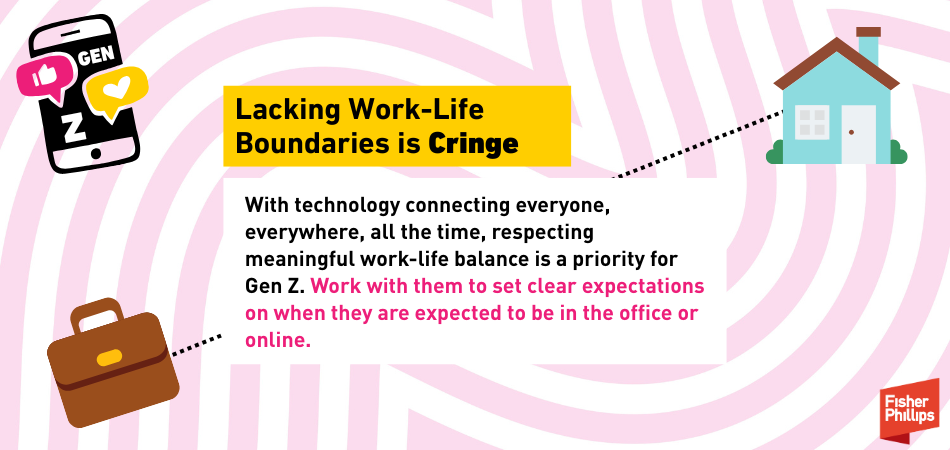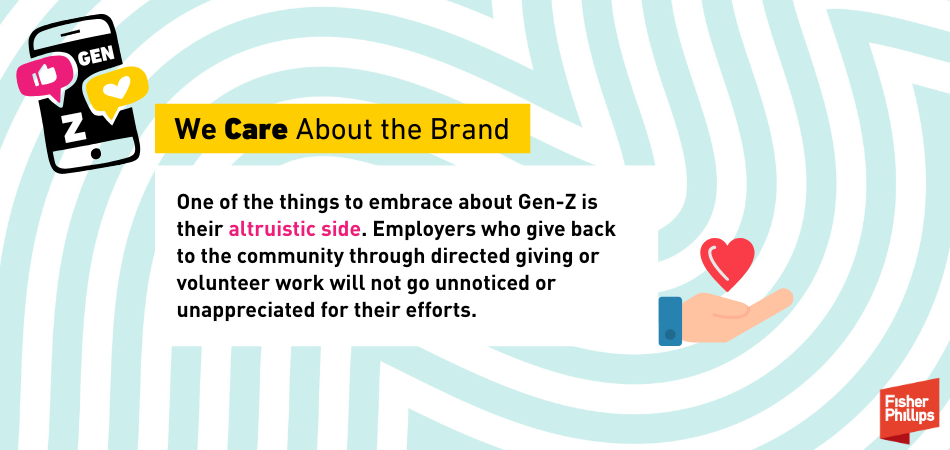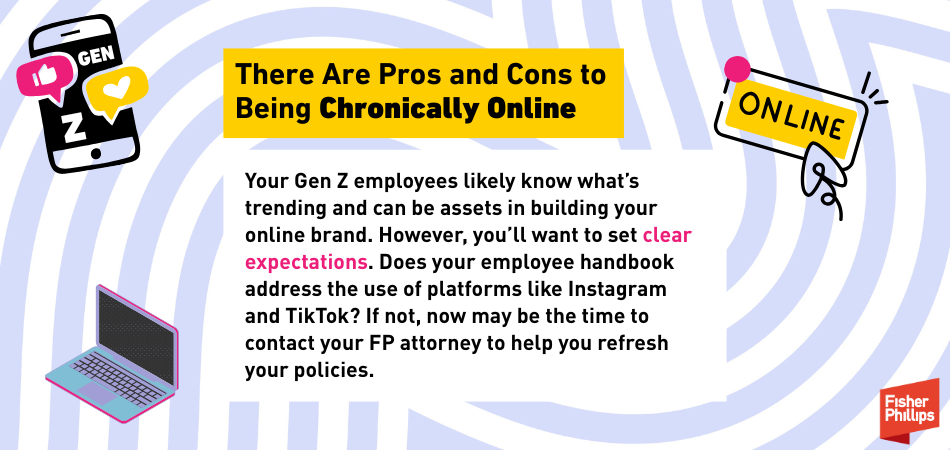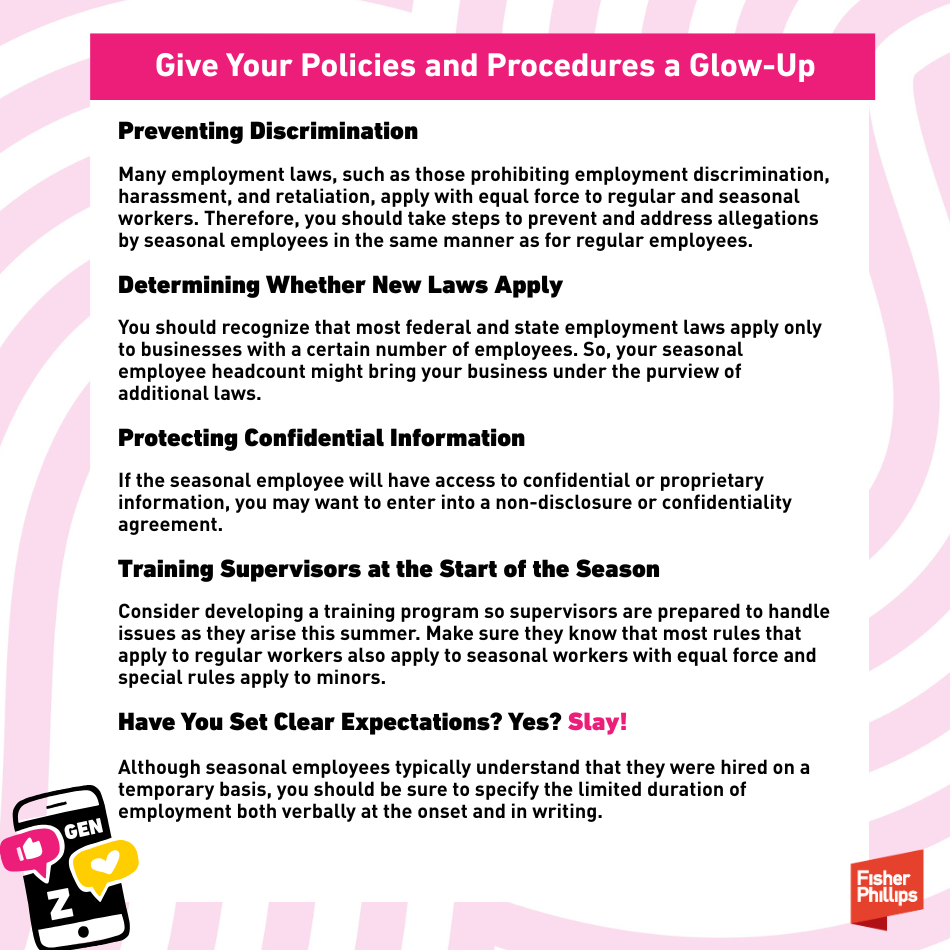As the weather gets warmer and you shift your focus to seasonal hiring, you’ll want to be sure to connect with Gen Z applicants, many of whom are college and high school students in search of summer jobs. These workers are “digital natives” who grew up with technology and social media, and as a result, have their own work preferences, influences, and slang that can be somewhat baffling to outsiders. Do you want to bridge the generational divide and create a welcoming and legally compliant workplace for all? Here’s your guide to hiring Gen Z this summer.
Gen Z Has Clocked In – and They Have Notes!
Gen Z is generally defined as people born between 1997 and 2012, which means members of this generation will turn 13 to 28 this year – and their presence in the workplace is growing rapidly. According to data from the U.S. Department of Labor, Gen Z surpassed Baby Boomers in the workforce for the first time in 2023. By mid-2024, the labor force by generations consisted of:
- 15% Baby Boomers
- 18% Gen Z
- 31% Gen X
- 36% Millennials
This means your hiring managers will want to understand what motivates Gen Z and what keeps them engaged. Here are six major points to keep in mind – with the caveat that every individual is different, some attributes are based on life-stage, and others are applicable to everyone, regardless of generation.
1. Sus Emails Are Not the Vibe – PERIODT
Gen Z has been communicating electronically since the womb, essentially. This means Gen Z workers are particularly attuned to subtleties and subtext within emails and texts. The biggest source of anxiety? The period – specifically, the “Thanks.” While it admittedly seems harmless, Gen Z workers might see the period as a means of passive aggressive “end of story” communication, even if it was once the go-to neutral punctuation. Using more exclamation points in communication might seem excessive to other generations, but it could make your newer Gen Z employees feel welcome and mitigate unnecessary stressors.
2. When We Excel, Let Us Know!
Gen Z doesn’t need to be coddled but making them feel like valued members of the team can go a long way. When providing coaching and training, consider doing so in a way that is constructive and growth minded. Everyone likes to know that the work they do is seen and appreciated. Even when feedback is negative, being thoughtful and constructive can encourage a team-oriented mindset that will help build confidence and ultimately lead to better work product.
3. Fully Remote Work Can Be Pretty Mid
COVID-19 may be in the rearview mirror, but it has forever changed the way we work. While Gen Z workers don’t necessarily want to be in the office five days a week, having a fully remote workforce also poses challenges. Remote work can be isolating, especially for workers who are just starting their careers. While every workplace is different, finding ways for new hires (of any generation, really) to meaningfully connect with their colleagues is generally a worthwhile effort. Consider developing mentorship pairings, hosting in-person social events, and taking an extra minute at the end of the day to check-in 1:1. This can help foster a sense of camaraderie that, in turn, produces better work. Plus, this is a great opportunity to make Gen Z workers feel like they are respected members of the team and to boost your retention efforts.
4. Lacking Work-Life Boundaries is Cringe
With technology connecting everyone, everywhere, all the time, respecting meaningful work-life balance is a priority for Gen Z. Simple things like delaying send on what would otherwise be a midnight email – or making it clear that workers are not obligated to respond after hours – can make a big difference. Work with them to set clear expectations on when they are expected to be in the office or online.
5. We Care About the Brand
One of the things to embrace about Gen-Z is their altruistic side. Employers who give back to the community through directed giving or volunteer work will not go unnoticed or unappreciated for their efforts. Engaging your new hires in these activities is also an excellent team-building opportunity.
6. There are Pros and Cons to Being Chronically Online
The association of Gen Z with social media is unavoidable. There can be incredible opportunity in wielding social media to your advantage. Your Gen Z employees likely know what’s trending and can be assets in building your online brand. However, you’ll want to set clear expectations. Does your employee handbook address the use of social media platforms? If not, now may be the time to contact your FP attorney to help you refresh your policies. Additionally, you can click here for four tips on updating your social media policies and staying on top of the latest trends.
At the end of the day, while Gen-Z is unique in many ways, all employees want to feel respected in their workplace. Creating a healthy, safe, and engaging environment for all employees is essential to maintaining a positive company culture. Read on for our specific tips for summer hiring.
What’s the Tea with Hiring Seasonal Workers?
Gen Z is represented by a range of workers who may approaching more senior levels of employment or still looking to land a summer job. If you’re looking to hire Gen Z workers when school lets out, you’ll want to keep the following tips in mind.
No Cap! A Bunch of Rules May Apply to Your Workplace
Here are six critical compliance items to add to your summer hiring checklist:
- Verifying Employment Authorization – Employers must treat seasonal staff in the same way they treat regular employees by verifying that they are legally eligible to work in the United States. Employers should complete the Employment Eligibility Verification form (I-9 Form) even for seasonal employees.
- Hiring Minors – Many employers, particularly in the hospitality and retail industries, are looking to hire teenagers to meet the uptick in demand during the summer. Don’t forget both federal and state laws restrict the time of day and number of hours that minors can work, the type of work that minors can perform, and the equipment they can use. The federal Fair Labor Standards Act (FLSA) governs child labor but allows states to enact more restrictive laws, so you must be aware of any local restrictions as well. In situations where the federal law and state law differ, you must follow the law that provides the most protection for the minor. You should also understand the restrictions on the types of job duties minors can perform. Click here for more information on this topic.
- Complying with Wage and Hour Laws – The FLSA and state laws generally require you to pay seasonal employees 1.5 times their regular rate of pay for all hours worked beyond 40 in a given workweek. However, certain workers are exempt from overtime requirements under both federal and state law. Under the FLSA, for example, employees of certain seasonal amusement or recreational establishments, organized camps, and religious or nonprofit educational institutions are generally exempt from overtime pay. Additionally, the FLSA provides for subminimum wage for minors under certain circumstances. It’s important that you review your seasonal employees’ status under federal and state law to determine whether overtime exemptions apply. You should also be aware of various state and local laws that apply to meal and rest breaks, predictable scheduling, and other requirements.
- Understanding the Definition of “Seasonal Employee” – You should determine whether your temporary employees are truly “seasonal.” According to the IRS, an employee is considered seasonal if the employment period is expected to last for six or fewer months and the need for the role usually starts and ends at about the same time each year – such as May to August for the summer season.
- Avoiding Misclassification – Businesses often misclassify employees as independent contractors and, in the process, open themselves up to significant potential liability. This temptation can be especially compelling with seasonal employees. You should avoid designating a seasonal worker as an independent contractor without first determining that the circumstances legally justify such a classification. You should also note that some states, such as California, Illinois, Massachusetts, and New Jersey, have stricter rules than federal law when it comes to independent contractor classification.
- Complying with PTO Rules – Unless employment continues beyond the summer, seasonal employees are ineligible for federal Family and Medical Leave Act (FMLA) leave because they will not fulfill the required 1,250 hours of work in a 12-month period. However, some state and local jurisdictions require employers to provide paid time off – such as sick leave – to employees who work for shorter durations. Seasonal employees may or may not qualify for such leave accruals, so it’s important to check the laws in your jurisdiction.
Give Your Policies and Procedures a Glow-Up
- Preventing Discrimination – Many employment laws, such as those prohibiting employment discrimination, harassment, and retaliation, apply with equal force to regular and seasonal workers. Therefore, you should take steps to prevent and address allegations by seasonal employees in the same manner as for regular employees. Don’t cut corners when it comes to onboarding seasonal employees. Consider providing the same training that you offer all throughout the year (knowing how to report harassment or discrimination, understanding your professionalism rules, etc.).
- Determining Whether New Laws Apply – You should recognize that most federal and state employment laws apply only to businesses with a certain number of employees. So, your seasonal employee headcount might bring your business under the purview of additional laws. Particularly if you’re a small business, you should pay attention to whether hiring seasonal employees will increase your total number of employees and trigger additional legal obligations.
- Protecting Confidential Information – If the seasonal employee will have access to confidential or proprietary information, you may want to enter into a non-disclosure or confidentiality agreement.
- Training Supervisors at the Start of the Season – Consider developing a training program so supervisors are prepared to handle issues as they arise this summer. Make sure they know that most rules that apply to regular workers also apply to seasonal workers with equal force. When it comes to hiring minors, supervisors should be trained on the hours and jobs they can do. You may want to set restrictions in the scheduling system for minors and give them different nametags or different colored shirts, so supervisors know not to ask them to work extra hours or on certain equipment.
Have You Set Clear Expectations? Yes? Slay!
- Although seasonal employees typically understand that they were hired on a temporary basis, you should be sure to specify the limited duration of employment both verbally at the onset and in writing.
- Further, you should require any seasonal employees to acknowledge, in writing, that they understand they are being hired for a limited duration and as “at-will” employees – meaning you and the employee have a legal right to terminate the employment relationship, with or without cause, at any time.
Conclusion
Fisher Phillips will continue to monitor developments in this area and provide updates as appropriate. Make sure you are subscribed to Fisher Phillips’ Insight System to get the most up-to-date information. For further information, contact your Fisher Phillips attorney or the authors of this Insight.


